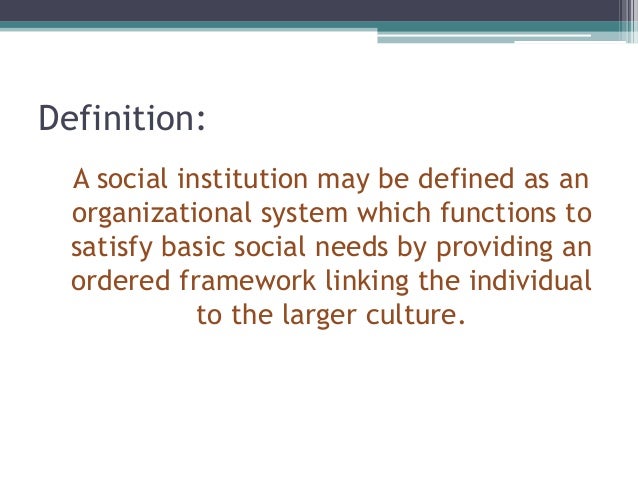Have you ever stopped to think about why we wear clothes, why we get married, or why we send our children to school? These seemingly mundane practices, and countless others, are governed by powerful forces woven into the very fabric of our society: social institutions. These intricate systems, often invisible yet deeply influential, shape our lives, dictate our interactions, and create the context within which we navigate the world.

Image: studypoints.blogspot.com
Understanding the definition of social institutions is essential for navigating the complexities of human society. By recognizing the patterns, norms, and structures that underpin our social world, we gain a deeper appreciation for the forces that shape our beliefs, behaviors, and identities. This knowledge empowers us to critically evaluate the roles of institutions in our lives, recognize their limitations, and advocate for positive change.
Defining Social Institutions
The term “social institution” refers to complex, enduring patterns of social behavior organized around fundamental societal needs. These institutions create a framework for social life, providing stability, order, and predictability. While often viewed as static and unchanging, institutions are dynamic entities that evolve in response to societal shifts, technological advancements, and cultural values.
Key Characteristics of Social Institutions
Social institutions share a set of common characteristics that distinguish them from other social phenomena:
- Established Patterns of Behavior: Institutions are characterized by regularized, patterned, and predictable behaviors that guide individual actions within the institution. These patterns evolve over time, but typically remain stable.
- Social Norms and Values: Institutions are founded on a system of shared beliefs and values that provide a moral foundation for the institution’s rules and practices. These norms and values are reinforced through social sanctions, either formal or informal.
- Social Roles and Status: Institutions define roles and statuses for individuals within the institution, with specific expectations attached to each role. These roles often carry social and economic benefits, shaping individual identities and social interactions.
- Social Structures and Organizations: Institutions are comprised of complex networks of relationships between individuals and groups, often manifesting through formal organizations like governments, schools, or religious institutions. These organizations provide administrative and logistical frameworks to facilitate the institution’s functioning.
- Influence and Power: Institutions exert significant influence and power over individuals and society as a whole. They set standards, allocate resources, and shape social behaviors, shaping the political, economic, and cultural landscape.
Examples of Social Institutions
Social institutions are ubiquitous, influencing all aspects of our lives. Some of the most commonly recognized institutions include:
- Family: This institution is responsible for the socialization of children, the transmission of cultural values, and the provision of emotional support. It provides structure and stability, defining familial roles and responsibilities.
- Education: Education serves as a primary institution for transmitting knowledge, skills, and values across generations. It prepares individuals for civic life, equips them with essential skills for the workforce, and cultivates critical thinking and innovation.
- Religion: This institution provides a framework for understanding the world and our place within it. It offers spiritual guidance, ethical frameworks, and a sense of community and belonging. Religion plays a significant role in shaping moral values, social practices, and individual identities.
- Economy: The economy governs the production, distribution, and consumption of goods and services within a society. It defines economic roles, sets standards for transactions, and influences individual wealth and social mobility.
- Government: This institution provides a framework for political decision-making, governance, and the rule of law. It establishes legal systems, enforces laws, and ensures collective well-being, often through public services and infrastructure development.
- Healthcare: Healthcare institutions ensure access to medical services, manage public health, and promote well-being. They define medical practices, regulate pharmaceuticals, and contribute to scientific advancements in medicine.
- Media: The media plays a powerful role in shaping public opinion, disseminating information, and influencing cultural trends. It acts as a platform for social dialogue, political discourse, and entertainment, driving cultural transformation and societal awareness.

Image: 39.98.226.223
The Importance of Understanding Social Institutions
Understanding social institutions is essential for navigating the complexities of the social world. It empowers us to:
- Critically Analyze and Evaluate: By understanding the mechanics of social institutions, we can develop a critical lens for examining their functions and potential limitations. We can analyze how institutions perpetuate inequalities, reinforce biases, and impact various social groups differently.
- Promote Social Change: Recognizing the influence of institutions allows us to advocate for positive change. By identifying areas for improvement, we can work towards dismantling discriminatory practices, reforming policies, and fostering societal progress.
- Foster Intercultural Understanding: Different societies develop unique sets of social institutions that reflect their cultural contexts and historical experiences. Understanding these variations fosters empathy and bridges cultural divides, facilitating communication and collaboration across diverse groups.
- Navigate Social Challenges: Social institutions provide a framework for addressing complex challenges facing society, such as poverty, inequality, climate change, and political instability. Understanding the roles and limitations of these institutions allows us to develop effective solutions and work collaboratively towards a more just and sustainable future.
Definition Of Social Institutions
Conclusion
The definition of social institutions provides us with a powerful tool for understanding the intricate workings of society. By recognizing the patterns of behavior, shared values, and interconnected systems that govern our social world, we gain a deeper appreciation for the forces that shape our lives and interactions. Understanding social institutions equips us to critically analyze their influence, promote positive change, foster intercultural understanding, and navigate the complex challenges facing our world. Explore the vast landscape of social institutions, engage in informed dialogue, and become an active participant in shaping a more just and equitable society.

:max_bytes(150000):strip_icc()/OrangeGloEverydayHardwoodFloorCleaner22oz-5a95a4dd04d1cf0037cbd59c.jpeg?w=740&resize=740,414&ssl=1)




